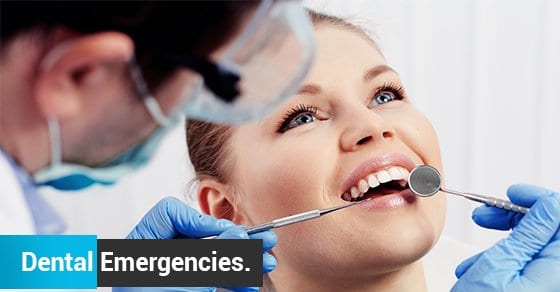Sometimes it can be difficult to tell if oral pain, swelling, or other discomfort is an emergency or not. Many people underplay the pain they feel, perhaps worried of overreacting or wasting the dentist’s time. Sometimes minor oral health issues can be taken care of at home or with over-the-counter products, but there are some dental emergencies that require immediate action. If any of the following apply to you, it’s essential that you see your dentist right away!
- Having a Tooth Knocked Out This is probably the most obvious situation that will require dental action as quickly as possible! If you have had a tooth knocked out in an accident and can recover the whole tooth, acting fast increases your chances of having the tooth replaced.After a tooth is knocked out, pick it up and hold it by the crown and rinse it under plain water. If possible, place the tooth back in the empty socket or hold it in your cheek. If neither of those is an option, place the tooth in a glass of milk. If you can get to the dentist within half an hour, there is a good chance the tooth can be saved.
- Oral Swelling Any oral swelling is usually a sign of infection in either the tooth or gums, which can be very dangerous. A deep, untreated cavity or other infection can spread through the mouth and into the jawbone, cheeks, and even throat, which can be fatal. Even before becoming that severe, infection can lead to abscess and tooth loss if not caught early.Infection may be treated with a root canal, antibiotics, or tooth extraction. Either way, to prevent the infection spreading and becoming more severe or possibly fatal, it’s important to see your dentist at any sign of oral swelling. In the meantime, rinsing the mouth with warm salt water or using painkillers such as Advil or Orajel can help ease the discomfort and decrease the swelling.
- Soft Tissue Injuries Accidents like falls can lead to soft tissue injuries in the mouth such as bitten tongues and cheeks. These injuries often bleed a lot as there is high blood flow in the mouth. When these injuries occur, it is best to rinse the mouth out with lukewarm salt water and attempt to stop the bleeding by applying pressure. If the bleeding doesn’t stop in 10-15 minutes, or the wound seems deep, then you should go to the dentist immediately.
It is always better to be safe rather than sorry when it comes to our oral health. If you are in any pain or discomfort or have any other concerns, you should call your dentist. They will be able to advise you about home care, or tell you to come in and see them.
